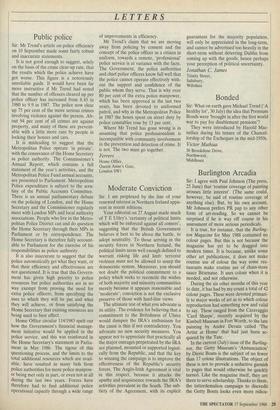Moderate Conviction
Sir: I am perplexed by the line of your renewed interest in Northern Ireland appa- rent in recent editions.
Your editorial on 27 August made much of T E Utley's 'certainty of political limits which will be enforced against all comers', suggesting that the British Government believes it best to be above the battle, to adopt neutrality. To those serving in the security forces in Northern Ireland, the political limits seem well enough defined to warrant risking life and limb: terrorist violence must not be allowed to usurp the democratic system. Moreover, you should not doubt the political commitment to a policy which seeks to reconcile the wishes of both majority and minority communities merely because it appears reasonable and `moderate% conviction is not the exclusive preserve of those with hard-line views.
The ultimate test of what you advocate is its utility. The evidence for believing that a commitment to the Britishness of Ulster would dampen the IRA's enthusiasm for the cause is thin if not contradictory. You advocate no new security measures. You appear not to appreciate that practically all the major outrages perpetrated by the IRA are planned, mounted or supported logisti- cally from the Republic, and that the key to winning the campaign is to improve the effectiveness of the Republic's security forces. The Anglo-Irish Agreement is vital in this respect, because it attacks the apathy and acquiesence towards the IRA's activities prevalent in the South. The sub- tlety of the Agreement, with its explicit guarantees for the majority population, will only be appreciated in the long-term, and cannot be advertised too heavily in the short-term without deterring Dublin from coming up with the goods; hence perhaps your perception of political uncertainty.
Jonathan C. James
Trinity Street, Salisbury, Wiltshire


































































 Previous page
Previous page